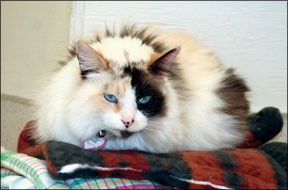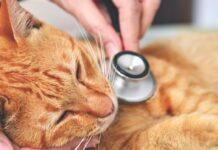These days, despite what we like to consider modern conveniences, people commonly complain that they just cannot find the time to get a good nights sleep. So much to do, so little time. When we finally do settle into bed, we like to be left to our dreams, undisturbed until the alarm takes us to tomorrow.


Bev Caldwell
288
Noisy neighbors, construction crews and barking dogs are beyond our control. But, what an unexpected, and unpleasant, surprise to be awakened by ones own cat! Restless behavior may be particularly hard to understand when your cat has spent the first 12 years of his life refusing to leave the covers until a decent sunbeam appears.
The first time that a senior cats cries call a person from sleep, there may be a sympathetic response. A naturally concerned owner might check the food supply. The next occurrence will be more puzzling. Clearly the cat is not wanting for food. Could there be another cat in the yard? Maybe a critter got into the house?
When no cause can be discovered, angry feelings may emerge. Sleep deprivation takes its toll. Your cat can catnap after you go to work. You must remain up, eyes open, mind engaged.
We need to solve this problem. As with any other behavior problem, an organized analysis will be needed. First, a medical condition must be considered. An elderly cat should be examined. He may be experiencing pain or discomfort that keeps him from sleeping through the night. A cat suffering from orthopedic pain can easily jump off the bed, but he will be reluctant to hop back up again. Instead, he might pace or wail, hoping that someone will notice him.
If the physical examination is normal, some baseline lab work will be indicated. A blood test may reveal that the sleeplessness is due to hyperthyroidism, a condition that causes an increased metabolism. Other diseases can affect a cats eating habits so that smaller, more frequent portions of fresh food are required.
Of course, all medical conditions will be treated with the appropriate medications. Hormones can be returned to normal levels, and pain can be managed. Sometimes, restless behavior continues and must be addressed directly. In other cases, there are no physical diseases. A primary behavioral diagnosis must be considered.
One condition that can lead to nocturnal wakefulness is attention-seeking behavior. Many cats crave more contact as they get older. Perhaps you have noticed that your cat has begun to call for you more frequently, even during the day?
Attention-Seeking Behavior
Offering a cat attention on demand may seem harmless. Actually, its quite the contrary. Cats quickly learn that when a person is busy – meaning up and about – their solicitation attempts wont succeed. When a cat determines that a person is “not busy,” expectations change. (Surely our lying prone for hours must be the ultimate indicator of “not busy!”) And the cat that has learned that a loud meow will bring food delivery will have similar expectations.
To treat a cat that has begun to wake you up for food or attention, concentrate on your daytime interactions. Try not to engage when he calls out to you. If you are relaxing, quietly say “not now” and put him into a cozy cat bed beside you. After he has settled for a bit, invite him over for some pets and cuddling. That same cozy bed can be placed on the bed when you go to sleep.
Similarly, avoid offering food when your cat is vocalizing in a demanding way. Unless contraindicated for medical reasons, try to delay the morning feeding for 20 minutes.
If your cat continues to wake you up, try filling a food dish that is equipped with a timer and an ice compartment. The dish can be set to open an hour before you expect your own alarm to chime.
Finally, consider that your cat may be suffering from cognitive decline. Just as aging humans often have restless and/or sleepless nights, cats may experience a shift in their sleep-wake cycle. If medically appropriate, your veterinarian (or a veterinary behaviorist) can recommend a special diet and may even prescribe medication to slow the progress of this condition and to reduce any associated anxiety.
Meanwhile, stimulate your senior cats mind. Play games that require some thought. Hide food in different places that may be mentally (but not physically) challenging to access. Teach him some tricks – “high five” or to ring a bell to earn a snack.
Let your veterinarian know if your cat is keeping you awake, if he is not using his litter box faithfully, or if he no longer greets you at the door. Dont assume that your cat is just getting old – he may simply need your help.



